In case you missed it, Yusei Kikuchi’s name has been plastered all over social media lately. Two days ago, Kikuchi went 7.2 innings against the New York Yankees, allowing just one earned run. That’s impressive, especially because it was in Yankee Stadium, but it’s not the reason for all of the fanfare. The commotion was that Kikuchi, rather brazenly, appeared to have a foreign substance under his ballcap.
Here’s a picture, from Twitter:
Every pitcher uses pine tar but Yusei Kikuchi could not be more obvious about it pic.twitter.com/b6IBNvmEAv
— 12up (@12upSport) May 9, 2019
Depending on the angle, it seems more likely than not that Kikuchi applied a copious amount of something to his hat, and he went to it an awful lot with his pitching hand. There’s no way to be absolutely certain that Kikuchi had a baseball-altering substance under the brim of his hat—but also, come on, even as a Mariners fan, it would be a massive undertaking to explain this as anything else. It all seemed rather reminiscent of when former Yankees pitcher Michael Pineda was ejected for donning an extensive amount of pine tar on his neck. This time around, though, they didn’t bother to check Kikuchi.
Although fans on social media appeared universally up in arms about Kikuchi’s use of a foreign substance (if you’re not familiar, just Twitter search, I don’t know, “Kikuchi pine tar”), the Yankees didn’t appear to be too bothered by it.
Via nj.com:
“I was too busy trying to figure out how to stop giving up runs,” Austin Romine said. “He had stuff on his hat? That’s not my zone. I don’t talk about that kind of stuff. There are other people that take care of that.”
“I could care less,” left fielder Cameron Maybin said. “Nobody noticed it, nobody said anything. We’ve got a lot bigger worries, trying to manufacture runs, trying to get on base, but I don’t think that had anything to do with it.”
Yankees’ manager Aaron Boone was asked about the matter and said he became aware of the alleged foreign substance in the eighth inning of the ballgame and said they’d take a look at it and take it from there. On Thursday, he had this to say:
One day later, what did Aaron Boone think about Yusei Kikuchi’s gunky hat?
“We looked at it and have some thoughts about it, but I don’t really have anything public to say about it. … We’ll try to handle it behind the scenes, how we think is proper.”
— Bryan Hoch (@BryanHoch) May 9, 2019
And lastly, the Yankees’ broadcast, from MLB.com:
Now, Boone sure sounds like he’s waiting for this all to die down, and the Yankees’ broadcasters, surprisingly, all but assent to Kikuchi using…whatever is on his hat. Taken together with the quotes from several Yankees hitters, you can say with confidence that the people who are most directly affected by Kikuchi’s actions don’t seem to have an issue.
But one specific quote stuck with me. Again, courtesy of nj.com:
“A lot of guys use stuff,” Luke Voit said. “It’s frustrating obviously because maybe then his curveball wouldn’t have been as good,” Voit added. “He might have made more mistakes with his fastball. But at the end of the day he had a no-hitter into the sixth inning.”
Voit hints that the foreign substance may have augmented Kikuchi’s fastball and curveball. That’s the most combative the Yankees get. The thing is, if Kikuchi did, in fact, apply a foreign substance to the ball, I’m not convinced it had too much of an effect. I’m going to barrage you with a number of graphics.
Pitch percentage, by game:
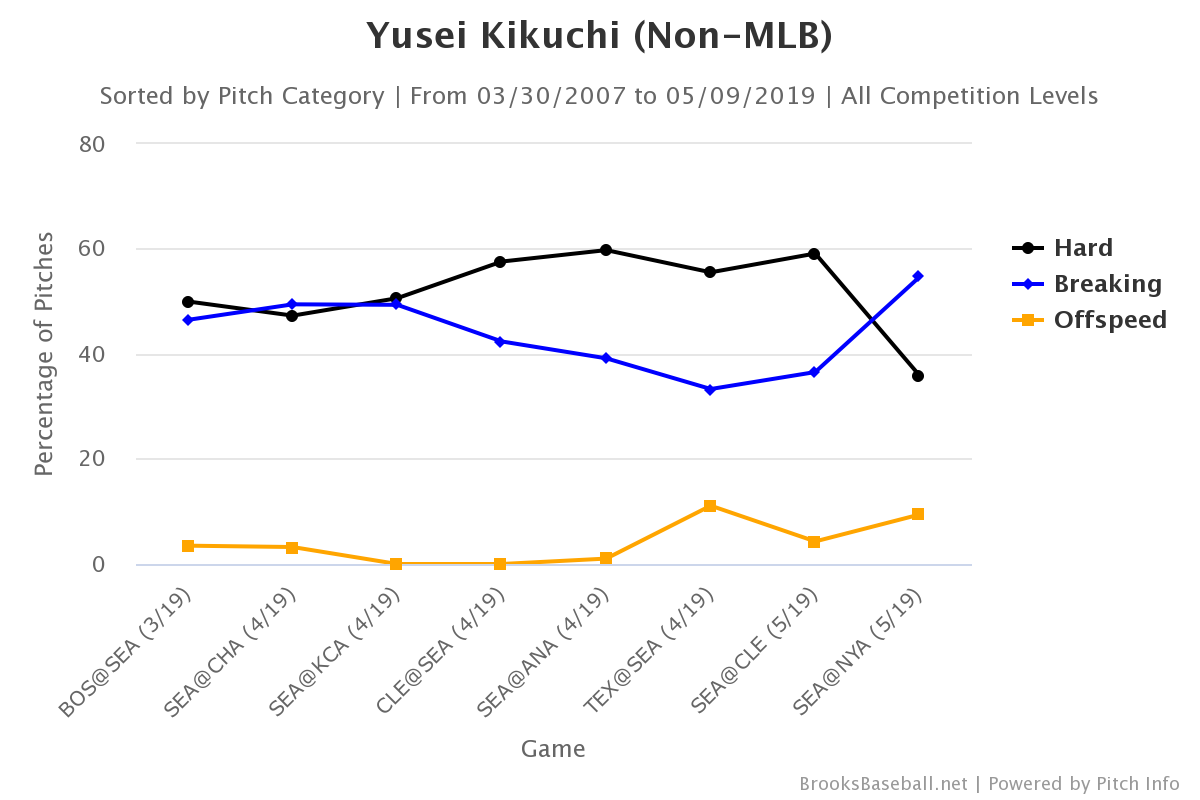
Pitch velocity, by game:
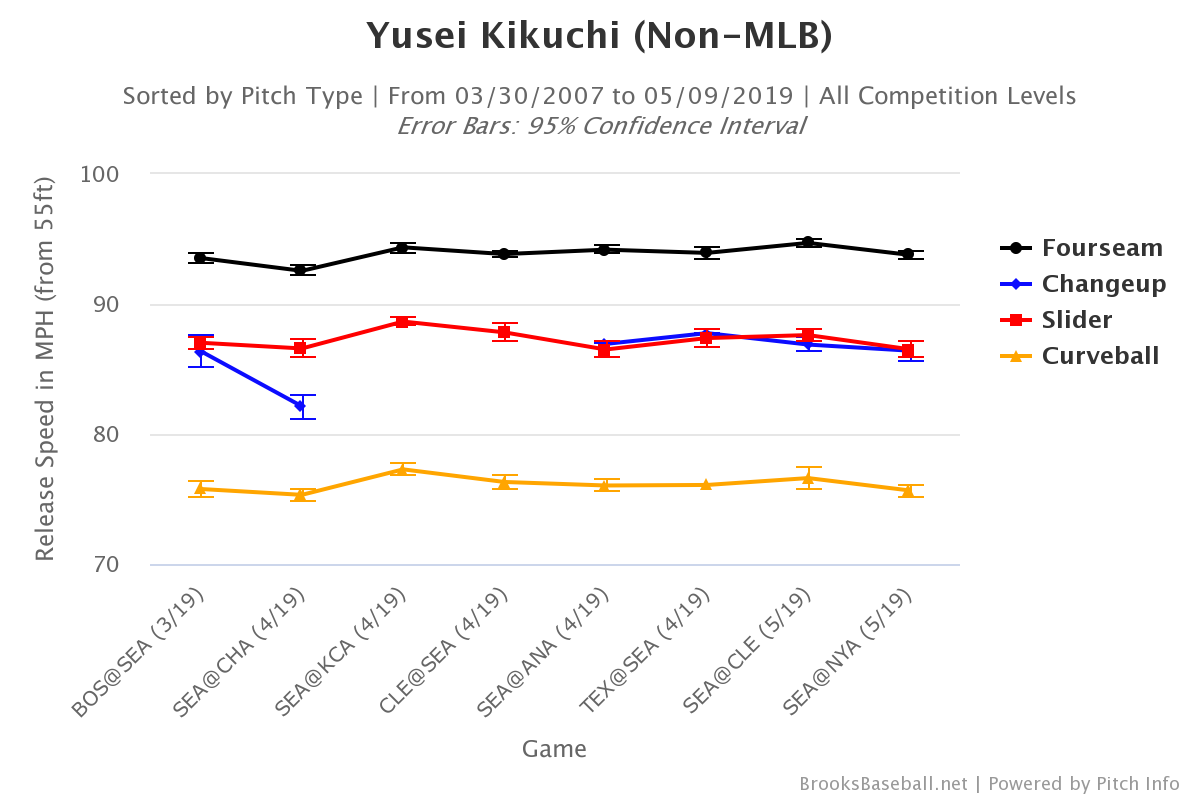
Horizontal movement, by game:
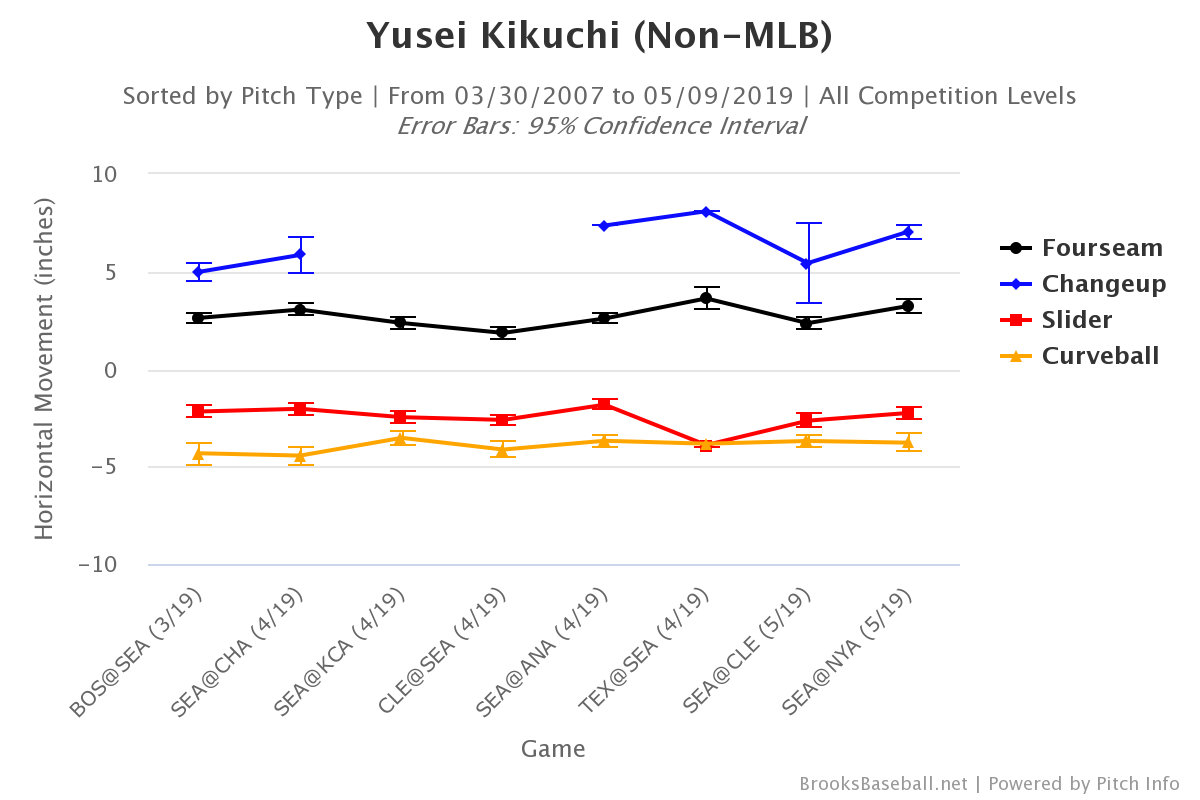
Vertical movement, by game:
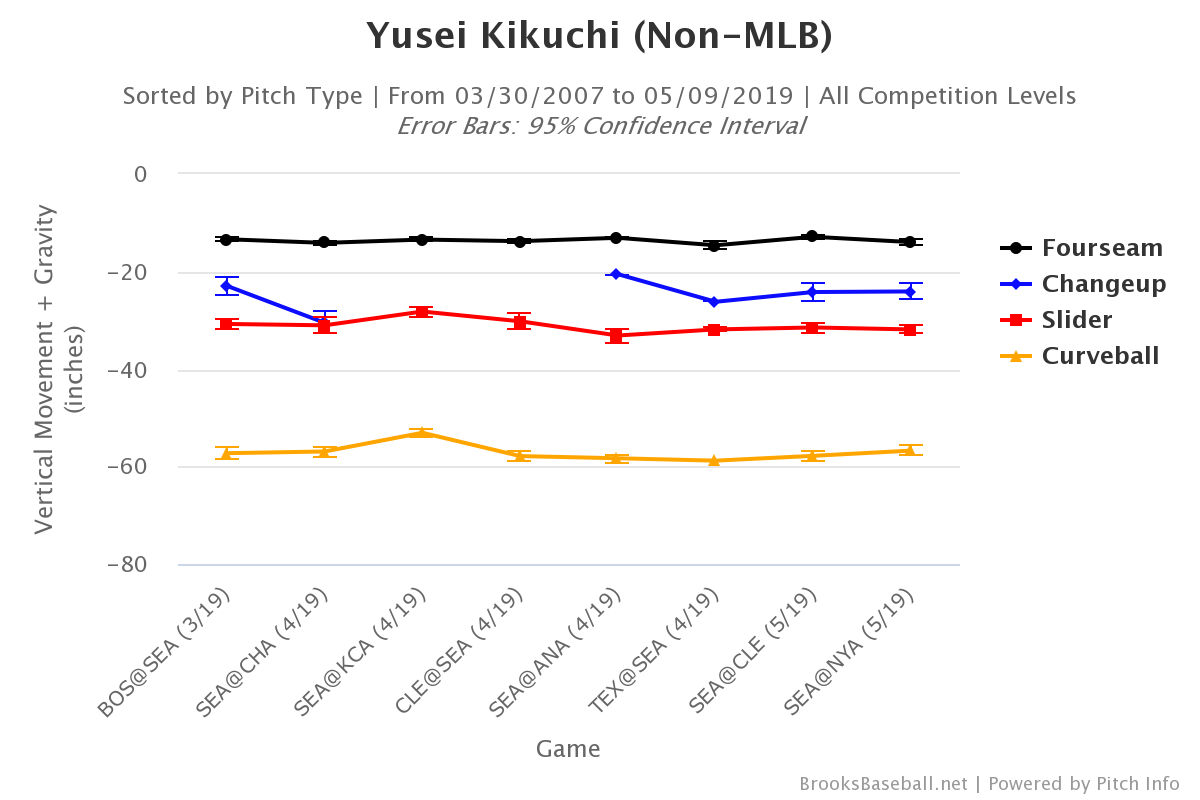
Spin rate, by game:
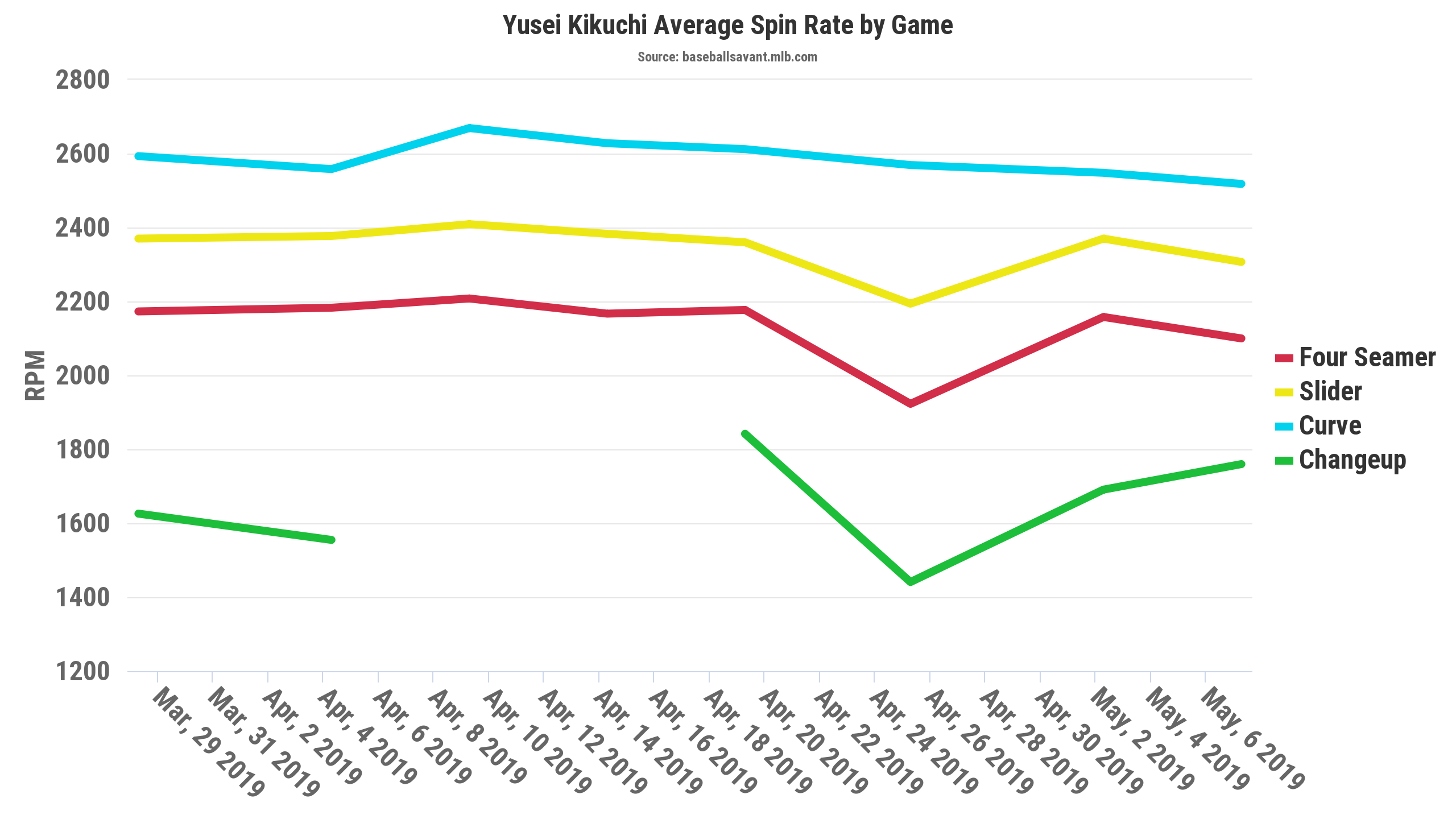
By these measures, there’s not any evidence to say that Kikuchi received any benefit. His velocity remained the same, as did his pitch movement, and, perhaps most importantly, his spin rate. He was the most breaking-pitch dominant he’s been all year, which ties back to Voit’s comments, but a heavy breaking-pitch approach isn’t unprecedented for him—look at his first three games of the year. It’s harder to say if it affected his grip or control on the ball—it’s notable that, by pitch value, Kikuchi’s fastball, slider, and curveball graded out as well as they have all year, but he also didn’t groove any fewer pitches than normal, either.
Now, I’m making two gigantic assumptions here, and they are (a) if Kikuchi was doctoring the ball, he only did it in this one game against the Yankees, and (b) Kikuchi is using pine tar to increase his spin rate and/or movement—not just for control. These could be fatal flaws in this argument, because pitchers are generally a little more subtle than Kikuchi chose to be. We don’t know if he’s done so in prior starts.
While I’m not convinced Boone cares to actually look into seeking punishment for Kikuchi—because his own pitchers probably use foreign substances themselves—there is a possibility, and it certainly wouldn’t be the first time it’s happened. But it is rare!
Here are the most recent players to be penalized for using foreign substances in the somewhat recent past:
- Michael Pineda (2014), 10 games
- Joel Peralta (2012), eight games
- Will Smith (2015), six games
- Brian Matusz (2015), six games
The first thing I noticed was that Major League Baseball has chosen to penalize players for using foreign substances similarly to how players are punished for their roles in brawls and intentionally throwing at hitters. The offenses don’t exactly feel commensurate with the suspension-lengths. Overall, when a player does get caught they’ve received, on average, a suspension of 7.5 games, so for first-time offenses, we can expect something like a seven or eight game suspension moving forward.
What you may also notice is that this basically never happens. Despite the widespread use of foreign substances across the league, a pitcher hasn’t actually been suspended for its use since Matusz. That’s because, for the most part, there’s an unspoken understanding around the league about pine tar and other foreign substances.
From 2015, regarding Will Smith’s ejection, per USA Today:
Brewers manager Craig Counsell said that it’s common for pitchers to use a sticky substance to help get a better grip in the ball, especially in cool conditions.
“It’s very common. It goes on on the other side, I guarantee you. It’s the rule. I think pitchers are using it but I guess you’ve got to be discreet about it.”
And from MLB.com:
“It was strictly just for grip,” Will Smith said Friday. We’re not trying to hit these guys in the head with 95-mph fastballs. There’s more than this game, too. These guys have families and stuff like that and it’s a safety issue also.”
But not everyone is as easygoing as the Yankees or Smith and Counsell regarding foreign substances. If you’ll remember, last year Trevor Bauer implied that pitchers on the Houston Astros were cheating, which members of the Astros obviously took exception to.
Here’s the tweet in question:
If only there was just a really quick way to increase spin rate. Like what if you could trade for a player knowing that you could bump his spin rate a couple hundred rpm overnight…imagine the steals you could get on the trade market! If only that existed…
— Trevor Bauer (@BauerOutage) May 1, 2018
And here’s the backlash:
Jealousy isn’t a good look on you my man. You have great stuff and have worked hard for it, like the rest of us, no need for this. I will ask though because my spin rate and spin axis on my 4 seem is a$$. https://t.co/jvbLuWWqgN
— Lance McCullers Jr. (@LMcCullers43) May 1, 2018
If only there was this thing where people who had been around baseball a long time taught people who hadn’t been around as long. Imagine the possiblity for improvement yr over yr! We could call it coaching! https://t.co/WI4X1TCbaW
— Collin McHugh (@Collin_McHugh) May 1, 2018
Relax Tyler … those World Series balls spin a little different…. ? https://t.co/MZ7iIPXhbC
— Alex Bregman (@ABREG_1) May 1, 2018
The day before Bauer’s remarks, he appeared to have indulged in a little in-game experiment of his own. After averaging a 2,294 rpm with his fastball on the season to date, Bauer came out in the first inning with a spin rate of 2,597 rpm, only for it to return to his baseline in the following innings. This jump (+303 rpm) falls in line with Bauer’s own estimations of gains in spin rate, as he estimated a player could conceivably get around a 200-400 rpm increase from using several forms of a foreign substance, depending on pitch velocity. That’s pretty damning evidence that Bauer was testing the effect of a foreign substance on his spin rate.
Now, Bauer’s experiment is the greatest anecdotal evidence that we have, as it pertains to foreign substances’ effect on spin rate, but he also has interesting opinions on its use as well. There are two ways in which we can address this predicament:
#1: Enforce the Rules
The rules should be enforced as they’re written. Pine tar is more of a competitive advantage in a given game than steroids are.
— Trevor Bauer (@BauerOutage) April 11, 2018
This is (sort of) what is happening right now, but the MLB and umpires are simply not policing it as much as they could be. That has a lot to do with what I’ve mentioned previously. Managers don’t bring it up—because every team is doing it—and hitters, to an extent, might actually prefer it. Hitters don’t like getting hit with errant balls (and can you blame them?) and as a result, it isn’t brought to the attention of umpires, except ever so rarely. This argument is simple: Actually enforce the rules in place!
#2: Change the Rules
I guess this is the equivalent argument to “Let the kids play!” but this time with pine tar. The argument is such that, if a vast number of players are going to use it anyhow, then why not just legalize it?
Here’s Bauer’s take:
Allow it. I don’t see that there’s a way to enforce it. Because you can’t go check a pitcher every single inning, every single pitch. And that’s currently how it is. You can get thrown out of a game and suspended for it if an umpire comes and checks and finds out. But it doesn’t happen.
As the rules currently stand, the players following the rules are, theoretically, harmed by them, and that seems silly.
This course of action would possibly require another rule change. Pitchers may pivot to a method more in line with actually “doctoring” the ball, which is very different from using a touch of sunscreen or pine tar for tackiness because of cold weather or a slick baseball. Pitchers, already, are better than ever, so it may come with an adjunctive change: Move the mound back, lower the mound, or change the ball. Some ideas do bring forth other issues, though. For example, won’t moving the mound back actually hurt hitters?
It’s a sticky situation (ba dum tssssss), because there’s a huge difference between malevolently doctoring the ball and what most pitchers are actually doing. The term “cheating” feels disingenuous, because, yes, it’s against the rules, but it’s often used for grip, not to increase movement or spin rate. Ask any coach or player. That’s not to say that foreign substances aren’t abused with malice, and I’m okay with those pitchers getting disciplined as is, but it seems like we’re getting to the point where we can all drop this charade of doing something while pretending we don’t.
Especially with the league ostensibly changing the seams and features of the baseball on an annual basis, maybe it’s time that the playing field becomes more level between pitchers—the league hasn’t exactly been kind to them. As the rules currently stand, they endanger two types of people: hitters and pitchers like Bauer. If pitchers are dissuaded from using a small amount of sticky stuff in inclement weather because they’re worried about the consequences, then that becomes a safety issue for hitters. For pitchers, there are players—such as Bauer—who claim a moral principle for not partaking in any use of foreign substances. The pitchers who do choose to use foreign substances for spin rate or movement purposes then have the upper hand on pitchers who do not.
We’re getting towards the point where we’re able to talk about these issues in a more productive manner. Because of this, maybe it’s time to start shifting towards legalizing the use of foreign substances in some manner. Even the most progressive of baseball fans show some form of opposition to rule changes, because it changes the game that we all know and love, but this whole facade that the general population of baseball fans has that it’s a rarity when pitchers use pine tar and the like is just untrue. Kikuchi isn’t the exception—he’s the rule.
Many managers and hitters don’t seem to mind foreign substances. Pitchers don’t care—the vast majority allegedly use them (More than 69% of pitchers, Bauer says, tongue in cheek). In this case, the Yankees commentators didn’t care, either. So, if the people most involved in baseball aren’t getting upset, why is it that we as fans make a big fuss about it every time we see a screengrab from Twitter?
For now, fans will go on, living in their obliviousness, where they’ll pretend that pitchers don’t use foreign substances. Then, inevitably, a player will get dinged for breaking the letter of the law, which at this point may as well be being too obvious. That player’s reputation will be tarnished for no good reason, and we will be upset. That is, until the next go-round of the circle of inaction.
Featured Image by Justin Paradis (@FreshMeatComm on Twitter)


Enjoyed reading this- great writing and content. This is the less interesting part, but I’m curious- do you have any thoughts on how allowing a better grip-enhancing substance should actually be implemented? This is what the rosin bag is for, so maybe there’s another item behind the mound, next to or instead of the rosin bag? Only thing is that still doesn’t change how hard it is to police additional substance use.
This is the tricky part, and it’s probably 30% of the reason it hasn’t been implemented yet. It’s not an easy fix.
There’s a couple of ways to go about it. In MMA, they inspect fighters before they enter the ring. The same idea could apply for pitchers before games, and in between innings. I think that’s really the only way to police additional usage. If did change the rule, they could go with a stricter suspension for using extra sticky stuff, but that feels regressive.
The Yankees booth doesn’t care because David Cone, who is a regular color commentator for them, is quite vocal during broadcasts about the fact that almost everybody that takes the mound uses some substance sometimes, and often admits that he did as well. I think they won’t change the rules, because if they did, usage would get out of control and abused. The Open Secret model keeps it from getting egregious.
Would it get out of control and abused, though? I’m not sure we know that, especially because we don’t know in what way they would implement acceptable use.